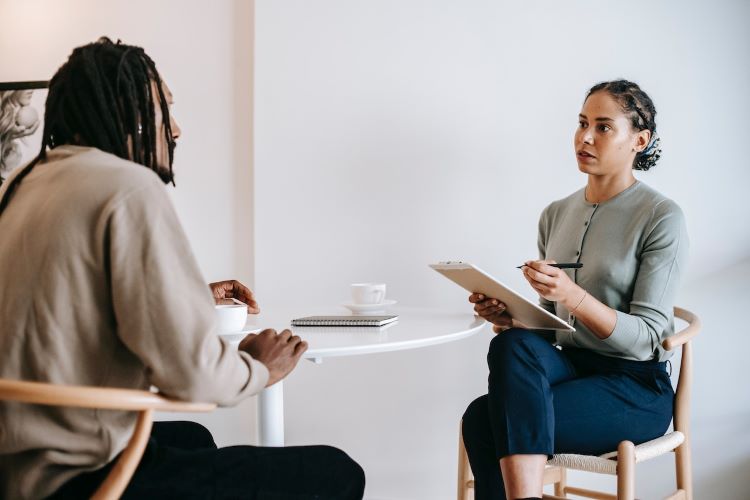Giving Back: How to Become an AA Sponsor
One of the biggest goals of many AA members is to eventually become a sponsor, helping other people navigate recovery and stay sober despite the many challenges they may face.
We’ve put together a complete guide to becoming an AA sponsor including what exactly the role involves, the problems you may encounter and why it’s so important to give back.
What is AA?
Alcoholics Anonymous (AA) is a free programme that helps people struggling with alcohol addiction to recover.
Many people find support and understanding through AA, and it can also be a great way to meet others who share similar experiences and find community. This can help you to stay sober long-term. [1]
AA meetings are held regularly and can be found almost everywhere across the world. The only requirement to join is a desire to stop drinking alcohol – there are no membership fees and you don’t even need to provide your real name.
If you can’t find an AA branch near you, there are regular meetings held online for those who live in rural areas or cannot attend in person for any reason.
During a meeting, members may be encouraged to share their thoughts and experiences if they feel comfortable doing so along with the 12 Steps.
Click here to find an AA meeting near you.
What are the 12 Steps of AA?

The 12 Steps are the foundation of AA and therefore can be used as a foundation for your recovery.
Each step represents a task that must be completed on your journey to sobriety. Many people find that following the 12 Steps not only helps them to recover from addiction, but also points them in the direction of a better way of living. [2]
The 12 Steps of AA
- We admitted we were powerless over alcohol – that our lives had become unmanageable.
- Came to believe that a Power greater than ourselves could restore us to sanity.
- Made a decision to turn our will and our lives over to the care of God as we understood Him.
- Made a searching and fearless moral inventory of ourselves.
- Admitted to God, to ourselves, and to another human being the exact nature of our wrongs.
- Were entirely ready to have God remove all these defects of character.
- Humbly asked Him to remove our shortcomings.
- Made a list of all persons we had harmed, and became willing to make amends to them all.
- Made direct amends to such people wherever possible, except when to do so would injure them or others.
- Continued to take personal inventory and when we were wrong promptly admitted it.
- Sought through prayer and meditation to improve our conscious contact with God as we understood Him, praying only for knowledge of His will for us and the power to carry that out.
- Having had a spiritual awakening as the result of these Steps, we tried to carry this message to alcoholics, and to practice these principles in all our affairs.
While many of the 12 Steps sound religious, you do not need to believe in God to follow the steps. You can replace ‘God’ with anything you feel comfortable with, such as ‘Love’ or ‘The Universe’.
It can take many years to complete the 12 Steps, and it’s normal to go backwards sometimes. Having regular meetings to discuss the steps and your feelings around them can go a long way in helping you to recover from alcohol addiction.
What is an AA sponsor and what do they do?
Many people in AA know about the advantages of having a sponsor, and studies have shown that having a sponsor can improve your chances of recovering from alcohol addiction.
One study found that 42% of people surveyed were able to stay sober for one year if they had a sponsor, while only 13% were able to stay sober for the same amount of time without a sponsor. [3]
So, what exactly is a sponsor?
A sponsor is an experienced member of AA who has been in recovery for a year or more and can act as a guide or mentor for newer members.
Most sponsors have completed all 12 Steps, so they are well-placed to support others on their recovery journeys.
AA sponsors can help new members understand the ins and outs of AA, keep them accountable in their recovery, advise on the 12 Steps and answer any questions they may have.
They can also act as a confidant and provide a listening ear if a member wants to speak about something that they don’t feel comfortable sharing in meetings, or to provide more information if needed.
AA sponsors do not get paid – they simply help others as a way to give back.
What does an AA sponsor not do?

Being an AA sponsor can be extremely helpful for both your own recovery and that of your sponsee, but it’s important to understand the boundaries within this type of relationship. This can help you to manage your expectations and know what is and isn’t appropriate.
Having an AA sponsor does not mean your sponsee no longer needs counselling. As an AA sponsor is not a professional, you cannot be a replacement for therapy. You can listen to them and act as a confidant, but you should not push your own views or ideas on them.
For this reason, it is recommended that your sponsee should not be a close friend or family member. They need someone who can be objective and hold you accountable, and many of the current people in their life are too close to do this effectively.
You should not become romantically or sexually involved with your sponsee. Addiction recovery is an extremely vulnerable time, and it is recommended that you avoid new relationships and instead focus on yourself while you heal.
Additionally, you should not pressure them to continue keeping you as their sponsor. Both of you are free to change sponsors or sponsees at any time and for any reason, and you should only stick with someone that you feel comfortable with.
How can I become an AA sponsor?
You don’t need to undergo any training or complete a certification course to become an AA sponsor.
If you’ve been in recovery for a year or more, have completed the 12 Steps and want to help others and give back to your community, you will likely be a great AA sponsor.
Make sure to read up on your requirements and what you can and cannot do and speak to other sponsors to get an idea of the challenges you may face.
Becoming an AA sponsor is simple – just let other members of your local meetings know that you are available to be a sponsor, or approach new members to make them aware of how you can help.
What are the challenges an AA sponsor may face?

While giving back can be extremely beneficial for your ongoing sobriety, you will likely face some challenges along the way.
It is possible to become triggered by the experiences or emotions of your sponsee, and this can lead to relapse if you don’t seek help. Speak to your own sponsor or counsellor if you are struggling with this, and feel free to take a step back from your role if needed.
In some cases, romantic or sexual feelings can arise between a sponsor and sponsee. These relationships are not encouraged within AA due to the vulnerability of the sponsee and the imbalance of power, and you may need to find a new sponsee if either of you are struggling to get past these feelings.
In some cases, you may simply not know how to help your sponsee. After all, you are not a trained therapist.
It’s important to remember that you are there to answer questions about AA, provide a listening ear and support your sponsee through their recovery – you don’t need to know all the answers or provide them with a detailed recovery plan. It’s okay to point them towards a counsellor if you feel they would benefit from professional help.
Am I ready to become an AA sponsor?
If you want to become an AA sponsor but are intimidated by the idea of taking on this responsibility, take a moment to make sure you feel ready.
It is recommended that you only become an AA sponsor if you have had a sponsor yourself. This gives you a better insight into the specific type of relationship between a sponsor and a sponsee, and you will know from your own experience how best to help.
Of course, you should ensure that you have completed the 12 Steps and have spent at least one year in recovery.
This will reduce your chances of becoming triggered by the challenges faced by your sponsee, and you will be able to draw on your own experiences of the 12 Steps and sobriety to support and advice in the most effective way.
If you meet the above requirements and feel ready to become an AA sponsor, go ahead and put yourself out there. You may even change someone’s life.
Why is giving back so important in AA?
If you have attended an AA meeting, you will likely have noticed how much emphasis is placed on the idea of giving back – so much so, that it is one of the 12 Steps.
So why is giving back so important in AA?
Addiction can make you feel isolated from your friends and family, and many people report feeling completely alone in the world. In fact, 73% of people surveyed in 2021 said they felt lonely at least some of the time. [4]
Even recovery can be difficult, as many of your old friends may still use substances and part of your recovery plan often involves distancing yourself from people from your past.
Giving back to AA and to the community in general is extremely important in AA, as it’s a very effective way to build community and find purpose in life.
You feel good about yourself when you give back, and feeling good about yourself is essential to continuing your sobriety.
Many people recovering from addiction have low self-esteem and self-worth, and building this back up over time primarily involves helping others and giving back.
This may involve becoming a sponsor, volunteering for a good cause or simply being there for others when they need someone to talk to.
How can I get an AA sponsor?
Finding an AA sponsor is a task that you are expected to complete yourself, but don’t worry – it’s much easier than you think.
Attend local AA meetings and take note of the more senior members and those that have been in recovery for a year or more, particularly if they have already completed the 12 Steps.
You may find that you feel more comfortable around a specific person, and this can be a sign that they would be a good sponsor for you.
Simply approach them before or after a meeting and ask whether they will be your sponsor. Try not to take it personally if they decline – they may have too many commitments or need to completely focus on their recovery.
There are many people out there who would be honoured to be your sponsor and support you through recovery, and you will find them at your local AA meetings.
Learn more about AA and sponsors through Rehab Recovery
Rehab Recovery provides a free referral service for anyone seeking help for addiction.
We can also support and advise you on the next steps of your recovery, even if you have no idea where to start.
Give our team a call on 0800 088 6686 for a free phone assessment and advice on the types of addiction treatment that would best suit you.
You can also learn more about AA and the 12 Steps on our website, which holds a wealth of information about substance and behavioural addictions as well as the different forms of treatment available.
References
[1] https://www.alcoholics-anonymous.org.uk/about-aa/what-is-aa/




